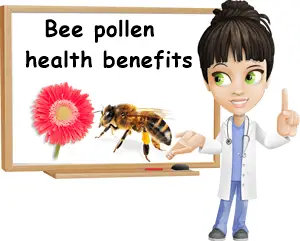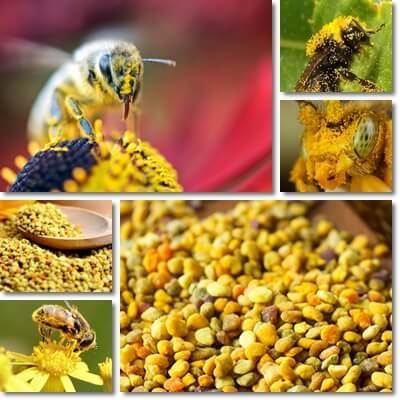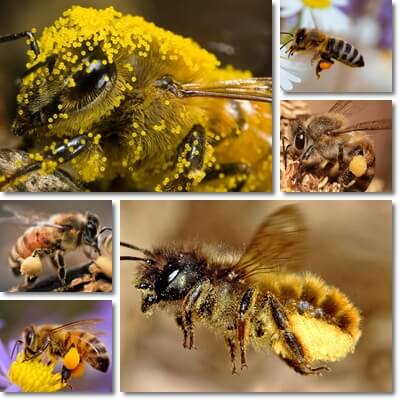Bee pollen is a honey bee product with a good nutritional value and an impressive therapeutic potential. It stands out as a source of essential and non-essential nutrients, antioxidants and a variety of other biologically active elements with therapeutic value. From a nutritional point of view, bee pollen is a natural product and a food supplement with antioxidant, antibacterial, antibiotic, anti-inflammatory and immune system-boosting properties. It is consumed for its reported strengthening effect on the body and immune system, cardiovascular and possibly anti-allergic benefits, effectiveness in reversing nutritional deficiencies, detoxifying and restorative action.
What is bee pollen? Bee pollen is plant pollen gathered by honey bees. When honey bees visit a flower to collect nectar for food, they also collect pollen particles, which they store in baskets on their back legs. By visiting flower after flower when full of pollen, honey bees also pollinate plants. But for them, pollen serves as a source of food due to its excellent nutritional value, being a particularly rich source of protein and essential amino acids. Pollen is also made into bee bread when mixed with honey and digestive enzymes.

What does bee pollen look like? Pollen particles are actually only visible under the microscope. The yellow lumps we see on the back legs of honey bees or the yellow dust we may get on the tip of our nose after smelling a flower are actually pollen particles. In reality, pollen particles are microscopic elements with a varying appearance. Different plant species have different-looking pollen. As such, pollen may be irregular in shape, round, elongated, prickly etc. Weight and size may also differ greatly, but the particles are extremely small. Colors may vary from light yellow to orange, reddish, brown, purple and black.
What are the health benefits of bee pollen?
Studies present bee pollen as a dietary supplement with a variety of beneficial health effects. According to research, here are 10 wonderful properties and potential health benefits of bee pollen:
1) Excellent nutritional profile. Bee pollen is rich in essential vitamins and dietary minerals, amino acids, fatty acids, but also carbohydrates, antioxidants and a wide range of other bioavailable elements with nutritional value. It contains vitamins C, D, E and provitamin A in the form of carotenoid antioxidants, B vitamins (B1, B2, B3, B5, B6, B9 and biotin, or vitamin B8), potassium, magnesium, sodium, phosphorus, iron, calcium, zinc, copper, selenium, manganese and silicon. Taken as a dietary supplement, bee pollen has an overall strengthening effect on the body, supporting us through physical and intellectual effort, helping us combat fatigue and better cope with the side effects of stress.
Some people even report a better disposition and a significant boost in energy levels after taking bee pollen supplements. For an insect as small as a honey bee, pollen is an ideal source of food which provides most of the nutrients it needs. Because of our size, we humans require significant amounts of food and nutrients to keep us alive and healthy and pollen just isn’t enough nourishment on its own, especially considering that consumption should be limited to very small amounts. This is why it shouldn’t replace a varied, natural and balanced diet.

2) Tonic properties and energizing action. Its dense and varied nutritional profile makes bee pollen a source of nourishment with an energizing effect and a tonic action. It is known to be used as a complementary natural therapy to reverse nutritional deficiencies, increase vitality, resistance to physical effort and improve recovery following disease. There are cases of bee pollen being successfully used to strengthen the body during chemotherapy.
3) Natural detoxifying agent and hepatoprotective. Animal studies show bee pollen also has a detoxifying and liver-protective action (Pollen extracts reduce the hepatotoxicity of paracetamol in mice, Phytotherapy Research). Apparently, supplementing can help in cases of heavy metal contamination and medicine-caused toxicity. For example, pollen has been shown to protect the liver tissue from damage and toxicity caused by paracetamol.
4) Strong antibacterial and antibiotic properties. Honey owes its antimicrobial properties partly to its pollen content (see all the different honey varieties on my honey page). Studies show pollen has strong antibacterial and antibiotic properties, hence its use for treating various respiratory, skin and other infections. Bee pollen is effective against antibiotic-resistant strains of bacteria such as Escherichia coli, Pseudomonas aeruginosa, Staphylococcus aureus etc. The elements responsible its antimicrobial effects are antioxidants (Antibacterial activity of honey and beebread of different origin against S-aureus and S-epidermidis, Food Technology and Biotechnology).
5) Reduces inflammation and swelling. One of the reasons behind the effectiveness of bee pollen (and various honeys) in wound and burn healing is the anti-inflammatory action of pollen. Bee pollen contains essential fatty acids and antioxidants (phenolic acids and flavonoids) with a superior anti-inflammatory action that recommends its use for wound healing, liver and rheumatic diseases like arthritis and other inflammatory conditions.
6) Boosts immunity. Research shows bee pollen increases concentrations of certain immune-boosting vitamins and minerals in the thymus, an immune system organ responsible for producing and maturing white blood cells. Moreover, it increases lymphocyte numbers and strengthens the body, improving the immune system response against infection and disease. Its antibacterial, antibiotic and strong anti-inflammatory properties play a decisive role in its ability to engage the immune system response.
7) Boasts cardiovascular benefits. Bee pollen taken as a dietary supplement is reported to help lower cholesterol and blood lipids levels as a result of its content of healthy unsaturated fatty acids and phytosterols (plant elements similar to cholesterol, which compete with it for absorption in the intestines). There are reports of people taking bee pollen supplements and experiencing lower cholesterol and triglyceride levels. Research suggests it may also help prevent blood clots and is potentially useful for atherosclerosis.
8) Antioxidant and anticancer potential. Bee pollen is rich in powerful antioxidants like flavonoids and phenolic acids, notably quercetin, kaempferol, chlorogenic acid, but also pigmented carotenoids like beta-carotene. Antioxidants scavenge harmful free radicals and prevent damage to cells that may cause them to turn cancerous. Animal studies suggest eating bee pollen may prevent tumor formation, as revealed by a 1948 study by doctor William Robinson, entitled Delay in the Appearance of Palpable Mammary Tumors in C3H Mice Following the Ingestion of PolIenized Food, published in Journal of the National Cancer Institute.
According to the study, mice were bred to develop tumors. Those fed with bee pollen either showed a delayed appearance of tumors or did not develop them at all, while those not fed with pollen developed tumors as expected. Similar tests and studies indicate a strong antitumor activity of bee pollen, supported by immuno-stimulating properties and the ability to induce apoptosis in cancer cells.
9) Believed to improve fertility. It has been theorized that pollen consumption can aid fertility in women. Research suggests bee pollen can increase estrogen and progesterone levels to encourage conception, increase ovarian follicles numbers and aid in the development of the corpus luteum.
10) Good for seasonal allergies. Plant pollen is a known allergen that causes minor to severe allergic reactions in individuals with an overactive immune system. At the same time, it can be good for allergies, particularly for hay fever and asthma, but also headaches. Pollen has been found to stop mast cells, a type of white blood cell, from releasing histamine, exerting an anti-allergic activity. If too much histamine is released, this causes extensive inflammation in the body and responses such as skin reactions, swelling, difficulty breathing, coughing, runny nose, watery eyes, closing of airways, low blood pressure, becoming life-threatening (Inhibitory effect of honeybee-collected pollen on mast cell degranulation in vivo and in vitro, Journal of Medicinal Food).

Can bee pollen be bad for you?
Yes, despite its wide range of potential health benefits, eating bee pollen can carry risks. Here are 4 potentially serious side effects and risks of bee pollen consumption:
1) It can cause severe allergic reactions. If you are allergic to plant pollen, it is best to avoid eating bee pollen, bee bread, honey or anything that may contain pollen because it can trigger a serious allergic reaction and even anaphylaxis.
2) Contamination risks. Depending on where honey bees source their food, they may collect nectar and pollen that are contaminated with heavy metals, pesticides and other potentially hazardous elements. Bee pollen may also contain bacteria and parasites.
3) Bee pollen and mold. Honey bees may occasionally collect pollen with different molds, resulting in a potential contamination with aflatoxins, dangerous, cancer-causing substances derived from said molds. If the bee pollen is not rigorously analyzed before sent out on the market, it can have a negative impact on consumer’s health.
4) Unsafe for pregnant women and nursing mothers, infants and young children. Expecting mothers, nursing mothers, infants and young children should not consume bee pollen because of insufficient research regarding its safety.
Conclusion
There is still so much to learn about the properties and health benefits of bee pollen. What we know so far is that pollen is a source of important nutrients and antioxidants, fatty acids, sugars, proteins and amino acids, providing support and strengthening the body. It has been revealed to have a strong antibacterial, antibiotic, anti-inflammatory, immune system and even fertility-boosting action, cardiovascular benefits and anti-allergic and antitumor potential. Nevertheless, consumption carries risks, especially for those with pollen allergies. It is important to talk to your doctor about the benefits and side effects of bee pollen and its use as a natural therapy.
